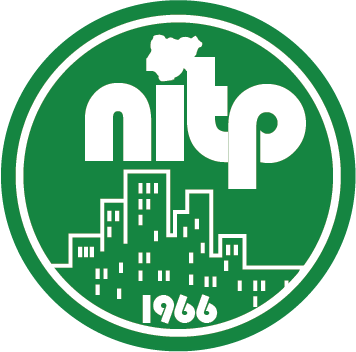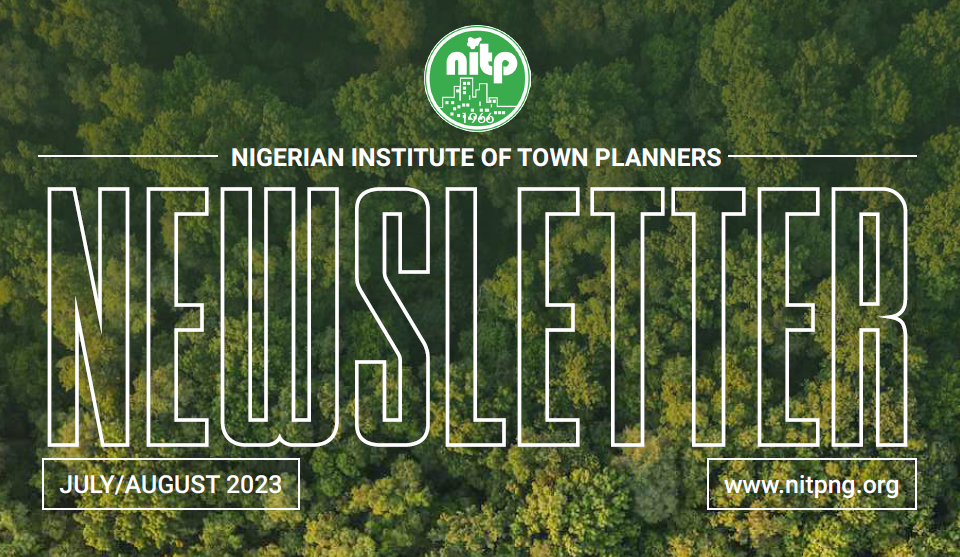SECOND PRESS CONFERENCE OF THE 25TH NATIONAL PRESIDENT OF THE NIGERIAN INSTITUTE OF TOWN PLANNERS HELD AT THE NITP SECRETARIAT, WUSE ZONE 5 ON 8TH FEBRUARY 2023

THEME: SO LONG, BUT NOT SO FAR
National Officers of the Institute, Your Excellences, Distinguished Stakeholders, Gentlemen of the Press, we (members of the Nigerian Institute of Town Planners) count it a great privilege to speak with you again today. In our interaction with you in December 2022, we lamented over the quality of human settlements in Nigeria which is akin to the jungle where prosperity would remain an unaccomplished dream due to lack of commitment to physical planning. The time between then and now might not have been long enough to expect a dramatic change in direction of policy and attitude of policy makers, but it is sufficient for whoever has ears to hear and possibly commence appropriate action(s) or propose to take action. We do not sound alarm because we want to make noise, but to draw attention of those who are in power or intend to be in power to be guided into taking right courses of action for us to realize the dream and vision of sane, rational and coordinated development in all its ramifications. We are not prophets of doom neither are we pessimists but we are not shy to talk to the circumstances of the moment. And if the moment does not seem to smell well, the hopes of a better and Brighter Future would be bleak and can only turn into a mirage.
People learn from mistakes of the past but can we comfortably say that concerning our nation and its leaders? That Nigerians are living by luck and chance is not news because hardly can anyone project what the next moment will provide in every sphere of life. No hopes concerning the next meal, nor how to pay children’s school fees, queues for petroleum products, pvc and new naira notes have become our bedmates, slums grow by the day, we fear and tremble during the rainy season because of incidences of flooding, building collapse, land grabbing, environments are filthy for lack of sufficient provisions for refuse management, people sleeping under bridges and shanty and naturally un-inhabitable places for lack of housing dot our urban and rural landscapes and a catalogue of other social, physical, economic and environmental problems. What then can we lean on or rely upon when people grope with hopeless days and sleepless nights?
Governments have come and gone with unclear visions and unfulfilled promises; hopes are usually rekindled at their inceptions but woefully dashed unfulfilled at their ends. Governments are still coming in future and in deed in a matter of countable weeks from now, but what hopes do we have to provide human settlements that are physically efficient, aesthetically pleasant, sufficiently provided with infrastructure, adequate housing, made socially stable and economically buoyant for the citizenry? This is the cry of the people in this country. We have been on this journey for so long but not so close to the answers we need. We have gone so far in creating constitutions, institutions and governments but not so far in governance or creating enabling environment for the people of this country to benefits of democracy which they are paying dearly with the proceeds of the God-given (natural) and man-made resources of the land.
We took my time recently to study the manifestos of the political class clamoring for various positions. They are loaded with ideas and ideals of activities and programmes. The political parties must have engaged persons who are versatile and endowed with grammar to write good treatise for them that spans between national security to other issues such as conflict resolution, job creation, agriculture and food security, industrialization, infrastructural provision, oil and gas development, education, health care, senior citizens, youth, sports, culture, women empowerment, environment, foreign policy, power, justice, democratic restructuring, human capital development and many other issues. A lot has been promised to give Nigerians the hope of getting into the Promised Land through infrastructure, industrial development, educational improvement, expansion and diversification of the economy, accelerating social development, easing transportation and improving convenience of living. But the real question concerning the lofty proposals is the reality of their thoughts.
Another question is whether the conceivers of these plans are aware that implementation must be on the solid land. And yet, another question is, do the promise makers know that there are some people (around them) who are trained and have become experts in the organization of landuses to bring the highest beneficial dividends to developments on land? And except these facts are answered through good knowledge or advice to the policy makers, we may end up again building castles in the air. But let me be quick to appreciate the efforts of some States and their institutions that have made remarkable progress in their planning efforts such as Lagos, Ogun, Kaduna, FCT and a few others. There is no doubt that human settlements in these places are more livable than others. The few other States that have made efforts need to support with relevant strong institutions, adequate manpower, funding and strong political will. Those that have not started the process of domesticating and implementing the Nigerian Urban and Regional Planning Law need to take urgent steps; while a State like Kwara that has got it completely wrong needs to retrace its steps to avoid the results of putting the cart before the horse or putting square pegs in round holes.
Back to our concern; looking through the plans of action of the political parties, there are a few indications of positive intensions for building a prosperous country. One of the manifestos indicated that if they are voted into power, they will ensure full compliance with town planning and environmental laws and edicts. Another party intends to embrace village and urban renewal programmes; encourage public-private-partnership (PPP) in housing development; improve and beautify the environment by establishing open space, parks and gardens for recreational purposes in cities, towns and within housing estates; and will not only provide affordable housing but will seek to build more inclusive communities comprising a mix of different income brackets and promises that their housing vision will be guided by equity and inclusiveness.
These indeed are good thoughts. But we are worried at seeing the location of these proposals in their documents. If the arrangement of the document would be the logic and priority of implementation, then urban and regional planning will be the last point of call. And if that becomes the reality, infrastructure, education, housing and all other developments would be carried out before they come to urban and regional planning. This would result in our perpetually practiced “confused growth or growth without effective development syndrome” It will result in mis-investment and under-development. This is why it appears that this nation has been long on the journey to development but yet not so close. Our efforts have gone so far but we are still not so close to hope to turning our dreams into reality. Sustainable development is normally preceded by laid out physical plans which take into consideration the economic potentials, social characteristics of the populace and environmental dispositions of space.
Before rounding up this discussion, we sincerely sympathize with families who lost their loved ones during the building collapse disasters we have recorded this year in Lagos, FCT and Rivers States. That within a month, we recorded four or more collapses is unacceptable. Information at our disposal give indications of lowered professional standards, negligence on the side of professionals in the construction industry coupled with incompetence, multiplicity of authorities in charge of granting development permits, controlling and monitoring physical developments within urban areas and impunity. This is inconsistent with established current international best practice. Effective measures must be established for city physical development administration.
We also want to urgently draw the attention of Nigerians and governments at all levels that the rainy season is around the corner. It is always said, “once beaten, twice shy”. It is better now to start the processes and activities that would avoid or mitigate flooding rather to wait for the disaster then engage is rescue operations to salvage lives and properties.
We are concerned about un-ending processes of installing infrastructure across States and in cities. Some road projects have spanned four administrations in this country. For example, Kaduna–Abuja–Lokoja road and many others which commenced over ten years ago are yet to reach acceptable levels of completion. Provision of city infrastructure in major urban settlements (including the Federal Capital City) need to be catalyzed to promote livability.
Nigerians have high hopes that there will be a turn-around in the conception and implementation of developmental ideas to impact positively on citizens and their physical environments which will in turn boost their entire lives. We therefore recommend to the sitting government and the incoming administration (political parties and their flag-bearers) at all levels of election to:
- Review their manifestos to reflect the critical role of physical planning in their agenda; and to carry out development in line with the provisions of the Nigerian Urban and Regional Planning, 1992 as amended in 2004; and in doing that, be prepared to establish relevant structures for their implementation as well as equipping them with the manpower needed, plant and equipment, infrastructure for administrative operations and adequate political will.
- Enforce city management and building control standards stringently to minimize disasters of building collapse. Let the authorities for once make offenders and violators to face the wrath of the law with possibilities of capital punishment. This will possibly scare people in the production process of buildings and make them to strictly comply with extant regulations.
- Understand that leadership is given by God; hence it should not be a “do or die” affair. Each contestant should realize that “tomorrow is another day” and appreciate that their families are not ready to trade them for any position or money. They can only be useful to them while they are alive.
- Ensure they work with the agreements entered into with INEC and other relevant agencies to have rancour-free electioneering campaigns and voting process devoid of any violence; and educate the electorate to vote wisely.
- Sensitize and install measures immediately to minimize flooding this year.
- Make efforts to complete infrastructural developments that predate the current administration and the ones they commissioned. This would serve as an indelible legacy.
Conclusion
We have been on the journey to prosperity for so long but at a speed so low because our intensions towards development have not been well-articulated through planning. This has weakened the hopes of citizens. Time has come for us to change the narrative, to change the speed and sequence of growth and development. Let us prepare to develop with professionally conceived plans. Engage town planners effectively to enable citizens enjoy the essence of politics and governance. With these, we can proudly join the rest of the world to preach and implement the gospel of sustainable development.
Ladies and Gentlemen of the Press, we thank you all for gracing this event and we look forward to making the public to share in our views.


